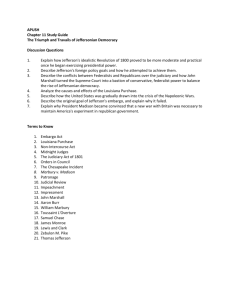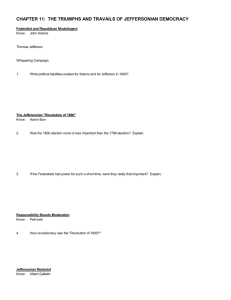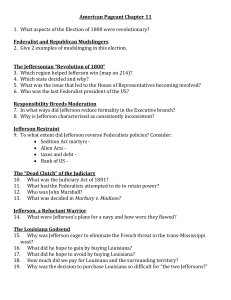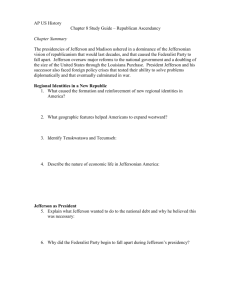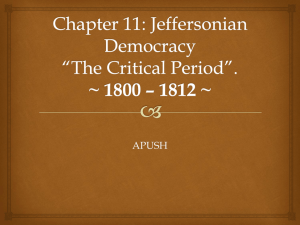Bailey Ch. 11 PPT
advertisement
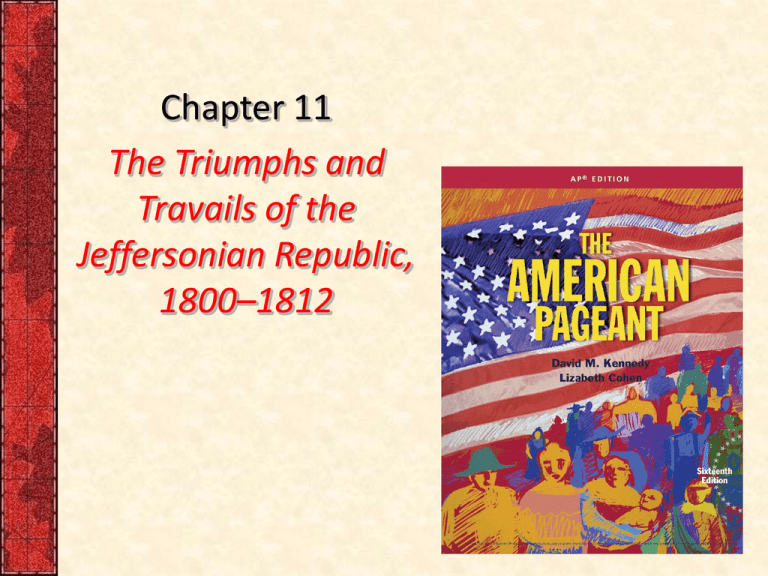
Chapter 11 The Triumphs and Travails of the Jeffersonian Republic, 1800–1812 I. Federalist and Republican Mudslingers – In 1800 election, Federalists faced handicaps: • Alien and Sedition Acts incited many enemies • Feverish preparations for war with France swelled federal debt and required new taxes, including a stamp tax • Military preparations ended up unnecessary and therefore seemed extravagant I. Federalist and Republican Mudslingers (cont.) – Federalists concentrated their fire on Jefferson himself: • He became victim of rumors: – Fathered numerous mulatto children by his slave women – Long intimacy with Sally Hemings – A liberal in religion, Jefferson supported separation of church and state in Virginia – He did believe in God, but preachers throughout New England thundered against his atheism p205 II. The Jeffersonian “Revolution of 1800” • Jefferson won by a majority of 73 electoral votes to 65 (see Map 11.1) – New York went for Jeffersonian, largely because of Burr's intensive activity – Most of Jefferson's strength was in South & West – 3/5 clause of Constitution was decisive in his victory Map 11-1 p206 II. The Jeffersonian “Revolution of 1800” (cont.) – Jefferson's victory dampened by an unexpected deadlock: • Jefferson, the presidential candidate, and Burr, the vice-presidential candidate, received same number of electoral votes for presidency • Under Constitution, tie could be broken only by House of Representatives (see Art. II, Sec. I. para. 2) – House was controlled by Federalists who preferred Burr – Jefferson won after a few Federalists abstained from voting II. The Jeffersonian “Revolution of 1800” (cont.) • Sometimes referred to as Revolution of 1800: – No revolution in true sense of word – Jefferson narrowly squeaked to political victory – He saw his mission to: • Restore republican experience • Check growth of government power • Halt decay of virtue II. The Jeffersonian “Revolution of 1800” (cont.) – Peaceful & orderly transfer of power was “revolutionary”: • Remarkable achievement for any young nation, especially so at this time in world history – Americans could take pride in vigor of experiment in democracy III. Responsibility Breeds Moderation • Jefferson inaugurated on March 4, 1801: – In swampy village of Washington, crude new capital – He spurned a horse-drawn coach and walked to the Capitol from his boardinghouse – His inaugural address was a classic statement of democratic principles p207 III. Responsibility Breeds Moderation (cont.) – New capital reflected simplicity and frugality of Jeffersonian Republicans: • Contrast with elegant atmosphere of Federalist Philadelphia, former temporary capital • Jefferson extended democratic principles to etiquette – Established rule of pell-mell at official dinners—that is, seating without regard to rank – He was shockingly unconventional in receiving guests • He started precedent of sending messages to Congress to be read by a clerk p208 p208 III. Responsibility Breeds Moderation (cont.) • Yet Jefferson in practice reversed many political principles he had championed • In practice, two Jeffersons existed: – One was scholarly private citizen – Other was harassed public official – He was therefore consistently inconsistent – It is easy to quote one Jefferson to refute the other p209 p209 III. Responsibility Breeds Moderation (cont.) • Jefferson's eviction of Federalists marked first party overturn in American history. • Jefferson showed unexpected moderation: – Dismissed few public servants for political reasons – Patronage-hungry Jeffersonians watched Federalist appointees continue in office IV. Jeffersonian Restraint • Jefferson, however, determined to undo Federalist abuses: – Pardoned “martyrs” convicted under Sedition Act – Enacted new naturalization law of 1802: • Reduced requirement of 14 years of residence back to 5-year requirement – Had Congress repeal excise tax because it hurt farmers IV. Jeffersonian Restraint (cont.) • Albert Gallatin proved to be able secretary of the Treasury – Agreed with Jefferson that national debt was a bane rather than a blessing – By strict economy, they reduced debt while balancing budget • Jeffersonians left Hamiltonian framework essentially intact: IV. Jeffersonian Restraint (cont.) – Did not tamper with funding national debt at par and assuming Revolutionary War debts of states – Launched no attack on Bank of United States – Did not repeal mild protective tariff – In future years, re-chartered a larger bank and bolstered protective tariff to higher levels – Jefferson's moderation cemented “Revolution of 1800” because showed political change need not be disastrous for defeated group V. The “Dead Clutch” of the Judiciary • Judiciary Act of 1801 – One of last laws passed by Federalists: • Created 16 federal judgeships and other offices • Adams signed some commissions for Federalist “midnight judges” on last night in office • Aroused bitter resentment for “packing” lifetime posts with anti-Jeffersonians – New Congress quickly repealed Judiciary Act of 1801 V. The “Dead Clutch” of the Judiciary (cont.) • Jeffersonians were also after new Chief Justice John Marshall: – Served 34 years under various presidents – Dominated Supreme Court by intellect and personality – Shaped American legal tradition more than any other figure – Committed to strengthening power of federal government p211 V. The “Dead Clutch” of the Judiciary (cont.) • “Midnight judges” presented Marshall with historical opportunity: • William Marbury appointed a justice of the peace by Adams • Sued when he learned commission would not be delivered • Marshall dismissed Marbury's suit • Marbury v. Madison (1803) enabled Marshall to address question of who had final authority to determine meaning of Constitution V. The “Dead Clutch” of the Judiciary (cont.) – Marshall promoted principle of “judicial review”— • Supreme Court alone had final word on questions of constitutionality • Marshall inserted keystone into arch that supports tremendous power of Supreme Court in American life – Jefferson urged impeachment of Justice Samuel Chase, but effort failed – Established precedent of judicial independence VI. Jefferson, a Reluctant Warrior • Early on, Jefferson reduced military: – Wanted to win friends through “peaceful coercion” – North African pirates of Barbary States (see Map 11.2) plundered & blackmailed merchant ships that ventured into Mediterranean – War across Atlantic was not part of Jefferson's vision Map 11-2 p212 p212 VI. Jefferson, a Reluctant Warrior (cont.) • Showdown came in 1801-1805, Tripolitan War: – Jefferson sent infant army to “shores of Tripoli” – Four years of intermittent fighting – Succeeded in extorting treaty of peace from Tripoli in 1805; bargain price of $60,000 (ransom payment for captured Americans) • Jefferson also advocated construction of small coastal craft; about 200 tiny gunboats built. VII. The Louisiana Godsend • 1800, secret pact signed: – Bonaparte induced Spain to cede immense region of Louisiana, including New Orleans – Spaniards at New Orleans withdrew warehouse rights guaranteed by Pinckney's Treaty of 1795 – Hoping to quiet clamor in West, Jefferson in 1803 sent James Monroe to Paris to work with Robert Livingstone, the regular minister there VII. The Louisiana Godsend (cont.) – Instructed to buy New Orleans and as much land as possible for $10 million – Napoleon suddenly decided to abandon dream of New World empire and sell all of Louisiana – Failed in effort to reconquer sugar-rich island of Santo Domingo (Haiti) – Slaves struck for freedom in 1791 – Haitian Revolution eventually crushed, but yellow fever killed thousands of French troops p214 VII. The Louisiana Godsend (cont.) • Without Haiti, no need for Louisiana's food supplies. • To keep Louisiana from British, Napoleon decided to sell it and use money for schemes in Europe. • Livingston was shocked when French asked him what he would give for all of Louisiana: – On April 30, 1803, treaties signed ceding Louisiana to United States for about $15 million VII. The Louisiana Godsend (cont.) – Treaties included immense tract to west of New Orleans that would more than double size of U.S.A. – Once again, two Jeffersons wrestled with each other: – The theorist and former strict constructionist versus the democratic visionary – Jefferson submitted treaties to Senate, while privately admitting purchase was unconstitutional – Gained 828,000 square miles at three cents an acre VIII. Louisiana in the Long View • Louisiana Purchase— – Secured western half of richest river valley in world & laid foundation of a future major power – Established valuable precedent for future expansion on basis of equal membership – Imperialism with a new democratic face – Would lead to displacement of many Indians – Made isolationist principles of Washington's Farewell operational because remove Europe from N. America VIII. Louisiana in the Long View (cont.) • Lewis and Clark's Corps of Discovery: – 1804 Jefferson sent personal secretary, Meriwether Lewis, and army officer William Clark to explore northern part of Louisiana – Exploration took 2 ½ years – Rich harvest of scientific observation, maps, knowledge of Indians, and adventure stories – Demonstrated viability of overland trail to Pacific p215 VIII. Louisiana in the Long View (cont.) Thousands of missionaries, fur-traders, and pioneering settlers later made their way to claim Oregon Country • Zebulon Pike trekked to headwaters of Mississippi River, 1805-1806 • Pike explored southern part of Louisiana Territory in 1807, where he sighted Colorado peak that bears his name IX. The Aaron Burr Conspiracies Louisiana Purchase expanded fortunes of United States and power of federal government • In short term, vast new territory and feeble reach of government raised fears of secession and foreign intrigue (see Map 11.3) • Burr, Jefferson's first-term vice president, helped justify such fears • Burr joined with Federalist extremists to plot secession of New England and New York • Hamilton exposed and foiled conspiracy p216 p216 IX. The Aaron Burr Conspiracies (cont.) • Incensed, Burr challenged Hamilton to a duel • Burr killed Hamilton • Burr thus destroyed last hope of effective leadership for Federalists • Burr then turned his plotting to trans-Mississippi West • Struck deal with General James Wilkinson, unscrupulous military governor of Louisiana and secret agent for Spain • Wilkinson's army was to meet Burr at Natchez IX. The Aaron Burr Conspiracies (cont.) • When Wilkinson heard that Jefferson learned of plot, Wilkinson fled to New Orleans • Burr was arrested and tried for treason • Marshall, strictly interpreting Constitution, insisted guilty verdict required proof of overt acts of treason, not merely treasonous intentions (see Art. III, Sec. III) • Burr was acquitted and fled to Europe • His actions demonstrated that it was one thing to purchase large expanses of territory but quite another to govern them effectively Map 11-3 p217 X. A Precarious Neutrality • Jefferson triumphantly reelected in 1804: – 162 electoral votes to only 14 votes for Federalist opponent • Napoleon provoked renewed war with Britain–conflict would rage for next 11 years. • During first two years of war, maritime United States enjoyed commercial pickings. X. A Precarious Neutrality (cont.) • 1805 Battle of Trafalgar: – Lord Nelson smashed French & Spanish fleets – Ensured Britain's supremacy on sea • Battle of Austerlitz in Austria (the Battle of the Three Emperors): – Napoleon crushed Austrian and Russian armies – Ensured his mastery on land X. A Precarious Neutrality (cont.) • 1806 London issued Orders in Council: – Closed ports under French control to foreign shipping, including American, unless vessels stopped at a British port first • Napoleon struck back: – Ordered seizure of all merchant ships, including American, that entered British ports • American vessels were caught -- no way to trade with one nation without antagonizing other X. A Precarious Neutrality (cont.) • Impressment also upset Americans— – Forced conscription of sailors by British – Some 6,000 U.S. citizens impressed by Britain (1808 to 1811) X. A Precarious Neutrality (cont.) • Chesapeake affair (1807): • British frigate stopped U.S. frigate, the Chesapeake, 10 miles off coast of Virginia • British captain demanded 4 alleged deserters • London had never claimed right to seize sailors from a foreign warship • American commander refused demand • British fired 3 devastating broadsides at close range • 3 Americans killed; 18 wounded • 4 deserters taken; Chesapeake limped back to port X. A Precarious Neutrality (cont.) • Britain clearly wrong as London Foreign Office admitted • London's contrition availed little as roar of anger swelled from infuriated Americans • Jefferson could easily have had war if he wanted it XI. The Hated Embargo Honor would not permit submission to British & French mistreatment, but USA not ready for war. • Warring nations needed United States for raw materials and foodstuffs • Jefferson thought if America cut off exports, offending powers would relent • Congress issued Embargo Act in 1807: • Forbade export of all goods from United States, whether in American or foreign ships • Embodied Jefferson's idea of “peaceful coercion” p218 XI. The Hated Embargo (cont.) American economy devastated by embargo long before Britain or France began to bend – Enormous illicit trade mushroomed in 1808, especially along Canadian border – Embargo revived moribund Federalist party – On March 1, 1809 , three days before Jefferson retired, Congress repealed embargo • Non-Intercourse Act formally opened trade with all nations, except Britain and France p219 XI. The Hated Embargo (cont.) Embargo act failed because Jefferson: • Underestimated British determination • Overestimated dependence of both belligerents on America's trade • Miscalculated unpopularity of a self-crucifying weapon and difficulty of enforcing it New England plucked new prosperity from ugly jaws of embargo: • Resourceful Yankees reopened old factories and erected new ones XI. The Hated Embargo (cont.) • Foundations of modern America's industrial might laid behind protective wall of embargo. • Jefferson, avowed critic of factories, may have done more for manufacturing than Hamilton, industry's outspoken friend. XII. Madison's Gamble • Madison took oath on March 4, 1809: – Just as conflict in Europe escalated – Non-Intercourse Act (1809) would expire in 1810 – Congress dismantled embargo completely with a bargaining measure—Macon's Bill No. 2 • If either Britain or France repealed its commercial restrictions, America would restore its embargo against nonrepealing nation • To Madison, bill was a shameful capitulation XII. Madison's Gamble (cont.) • Macon's Bill No. 2: – French implied their restrictions might be repealed – Madison did not trust Napoleon, but he gambled – Threat of exclusive U.S. trade with France would lead British to repeal restrictions – Gave British three months to revoke Orders in Council & reopen Atlantic to neutral trade – British refused; Madison's gamble failed p221 XIII. Tecumseh and the Prophet • When 12th Congress met in late 1811, older “submission men” replaced by young hotheads, many from South and West: – Dubbed war hawks by Federalists, newcomers advocated war with England – Also wanted to destroy renewed Indian threat for settlers moving to trans-Allegheny wilderness XIII. Tecumseh and the Prophet (cont.) Two Shawnee brothers, Tecumseh & Tenskwatawa, known to non-Indians as “the Prophet,” decided to resist tide of white encroachment •Began to form confederacy of all tribes west of Mississippi •Frontiersmen and their war-hawk spokesmen became convinced that British in Canada were nourishing the Indians' growing strength •In 1811, William Henry Harrison gathered an army and advanced on Tecumseh's headquarters XIII. Tecumseh and the Prophet (cont.) Tecumseh was absent, but the Prophet attacked Harrison's army with a small force of Shawnees • Shawnees were routed and their settlement burned • Battle of Tippecanoe made Harrison a national hero • Discredited the Prophet and drove Tecumseh into an alliance with British • During America's war with Britain, Tecumseh fought for England until killed in 1813 at Battle of the Thames • With his death, dream of an Indian confederacy perished p222 XIV. Mr. Madison's War • Pushed by war hawks & upset by Indian attacks, Madison believed war with England inevitable by 1812. • Madison also believed war would restore faith in republican experiment. • Congress approved request for war in June: – Republicans, esp. South & West, supported war – Federalists, esp. from New England, opposed XIV. Mr. Madison's War (cont.) • Many New Englanders refused to support war and actually helped British. • USA went to war badly divided by party and by section. p223 p224
